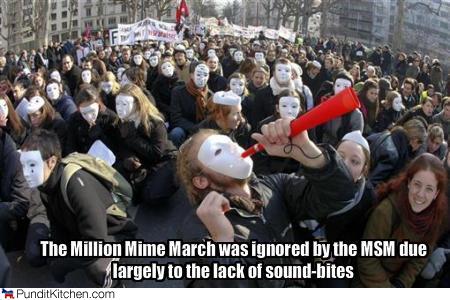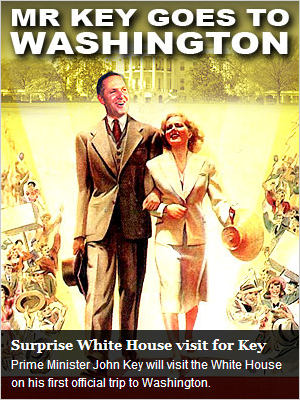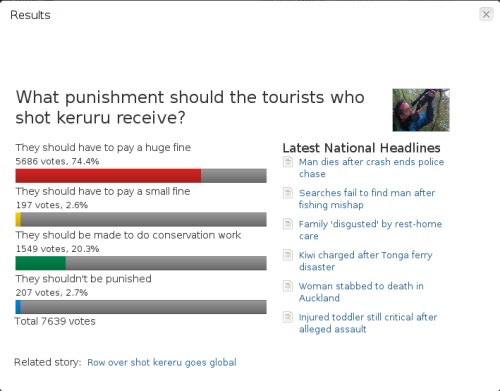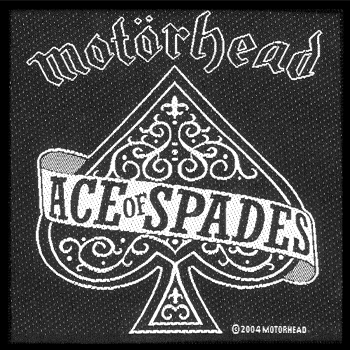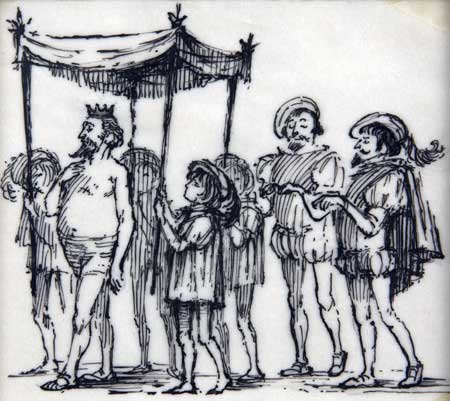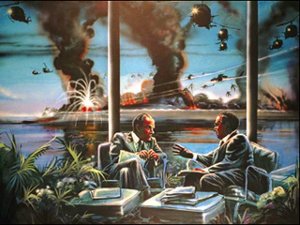Commenter Alexandra at The Standard picked up on a report by Radio NZ that John Key joked about TÅ«hoe as cannibals:
“The good news is that I was having dinner with Ngati Porou as opposed to their neighbouring iwi, which is Tuhoe, in which case I would have been dinner,” [Key] said, “which wouldn’t have been quite so attractive.”
Now, a reference to cannibalism in any leader’s speech is bad enough, but joking about it in the context of the government’s betrayal of TÅ«hoe, and Key’s failed attempt to speak for the mÄori party regarding that betrayal would be absurd if it wasn’t so insulting. Not only that, but the reference to NgÄti Porou was all the worse, given the complex history of those two iwi, which was also in the news recently but of which Key appears to have no awareness.
Two main questions occur to me: first was this a calculated move to distance himself and the government from the sense he has “gone native”, or just an idiotic off-the-cuff remark? (Essentially: bad will, or just incompetence?) And second, what will it take to prevent the mÄori party from walking away? As Marty Mars says, this is a significant matter of the mana of TÅ«hoe, and the mana of MÄori in general. It cannot just be left to lie: either the mÄori party walks away, or some sort of meaningful reparation — you might call it “mana enhancement” — must be offered by the government, not only to TÅ«hoe and the party, but to MÄori in general. The mÄori party are in a tough spot; as I argued yesterday, MÄori don’t have the luxury of just throwing their toys whenever they don’t get their way. But something has got to give.
Oh, and as per PÄkehÄ Standard Operating Procedure on issues like this, wait for the MÄori response to be declared hypersensitive.
Update: Same being asked by Lynn at The Standard.
Update (20:25) Much has become clear since I wrote the post. Some updated thoughts follow.
First, it’s clear that this wasn’t an inadvertent, casual comment — it was, if not a planned and sanctioned statement then clearly a calculated one intended, after apparently growing discord at the Lower North Island National party conference this weekend past, to win Key and the government back some of its reputation for driving a hard bargain with MÄori, and for not being a PC pounamu-wearing hand-wringer. So the initial diagnosis is “bad will” rather than “incompetence”. This was a simple continuation of the negotiative process which Key chose to stall by unilaterally ruling out the return of Te Urewera National Park; Key providing an opening for TÅ«hoe to continue dialogue, or not.
Second, it’s pretty well-calculated. It would have been easy for TÅ«hoe (and others) to publicly overreact and confirm PÄkehÄ New Zealand’s worst instincts about them. It would also have been easy for the mÄori party to walk away from the coalition deal, and I do think this is another factor in favour of that course of action. But they haven’t done so. Tamati Kruger’s response that the joke was “not funny, in poor taste and unbecoming of a prime minister” is pretty strongly-worded but shows its own sort of gallows-humour, indicating that Kruger (seasoned negotiator that he is) understands the game being played, and is prepared to continue playing it, given some caveats. Having today said that Key had lost his nerve Kruger has held his. He was magnanimous and humorous when speaking to John Tamihere and Willie Jackson about the topic on RadioLIVE this afternoon, but pretty clear that the deal is still to be closed, and it will now take some closing.
Third, Key has publicly insulted both TÅ«hoe and the mÄori party in the past week, and this does still need to be addressed. All parties seem to have chosen to address it around their respective negotiating tables, rather than in public, but behind closed doors these people will be furious at having been so treated, and for all that they’ve gained ground with the redneck street, that’s ground National will need to make up inside the wharenui. To put it in terms Key, as a former currency trader who worked a lot in Asia, would understand: the price of doing business just went up. And it went up quite a lot, because failure to accede to that increase means TÅ«hoe can now justifiably walk away from negotiations which are already almost two years underway, claiming that the negotiating team has no legitimacy, having been unilaterally overruled by their own prime minister, apparently just because he changed his minds. If they do that, expect every other current negotiation to go the same way. That’s an unacceptable political cost for Key before the next election, let alone the one after (by which all outstanding claims are supposed to be settled).
Fourth, a public sense is beginning to build of Key as the one who is endangering the relationship, after the opposite sense developed around Hone Harawira’s comments last year. If the coalition between National and the mÄori party fails, it will be seen as his failure to manage the relationship adequately, and that damages his own master narrative of being an efficient political manager and an all-round nice guy. As marty mars said in another comment on The Standard, the concessions granted to MÄori by Key’s government are “barbed” — they can’t be revoked or withdrawn without sustaining substantial political damage, which means that if the mÄori party sees genuinely irreconcilable differences and an opportunity to dissolve the agreement without being seen as unreasonable, they are able to do so. But as Neil says in the comment thread below, and as I’ve been arguing to little avail for ages, the mÄori party’s best play vis-a-vis either major party is the threat to go with the other. Labour partisans and much of the wider left wish it were not so, but if Labour get a sense that they have a monopoly on the mÄori party’s attentions again, then further concessions will be rare and threadbare.
Fifth, the KBR response is just what you’d expect, complete with gratuitous references to the alleged taste of human flesh, and ginga jokes. Sigh.
Thanks for the discussion so far. Responses to other comments below.
L

